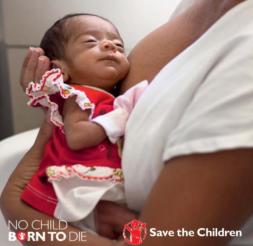Save the Children's latest report, which highlights the importance of breast milk in reducing malnutrition, has been criticised on Twitter for its recommendation to add cigarette-style warnings advising that "breast is best" on baby formula packaging.
The charity's Superfood for Babies report says that if every child started breastfeeding within the first hour, when the mother's milk contains the most potent immune-system boosters, 830,000 young lives could be saved. The report runs alongside a petition to leading baby formula producers Nestle and Danone calling for them to dedicate a third of packaging space as a "warning that formula is inferior to breast milk".
In response, some have taken to Twitter with concerns that the warnings are unfair to those unable to breastfeed, making them feel more "guilty".


Journalist Lucy Elkins said "Health warnings on #formula milk will make those, like me, who struggled to breast feed feel even more of a failure."
Author of 'Take control of your endometriosis' and nutritional therapist Henrietta Norton said, linking to a story on the report: "Baby milk 'should contain warnings that breast is best' http://soc.li/gOrUkYY. Factually correct but more guilt for those who can't?"
Others simply expressed their anger calling the report a symptom of the "nanny state" or adding "#loadofnonsense" to a retweet of national newspaper articles highlighting the move.
However the report has received an overwhelmingly positive reaction when viewed through the charity's #firsthour hashtag, with celebrities including Victoria Beckham, Donna Air and Myleene Klass lending their support to the campaign.
Speaking with civilsociety.co.uk Kathryn Rawe, co-author of the report, said:
"It's certainly not our intention to make anybody feel guilty. One of the big sections of the report is that we’re trying to make women feel empowered to make their own decisions about how they feed their baby which often they’re unable to do. It’s very much a topic that is close to people’s hearts and we don’t make these recommendations lightly. We know that breastfeeding is one of the best ways to tackle malnutrition and save lives. It really is the closest thing to a silver bullet we have."


Rawe, a global health advocate in the child survival team of the policy and research department of Save the Children, said that the recommendations are designed for a global change, and while they could make the most difference in developing countries, every mother deserves the same information.
“We’ve got examples of infant formula packaging from all over the world. There’s a WHO international code on the marketing of breast milk substitutes which has specific language that’s required for products and we’ve found that on some products it's so small you can barely read it.
"It’s very much that we want to see that recommendation being put into practice and rather than just paying lip-service to it, we want to see it make an impact and do the job it's intended to do, which is to provide information for mothers, and we think that’s something that every woman has a right to.”
She added that while there is specific wording in the international code, the overall message can be amended to fit the context of the country in which it relates to. Rawe cited the example of India where the code deems that formula must have the additional warning of the possibility of diarrhoea.
The 63-page report also calls for policies to ensure mum and baby are kept together after delivery as much as possible, employment and pay security for mothers and for a boost in the number of trained health workers to support breastfeeding.
| Want access to all civilsociety.co.uk content?Subscribers gain access to all expert advice, analysis, surveys, special reports and the full archive of content from as little as £43.20 per year. Find out more... |










